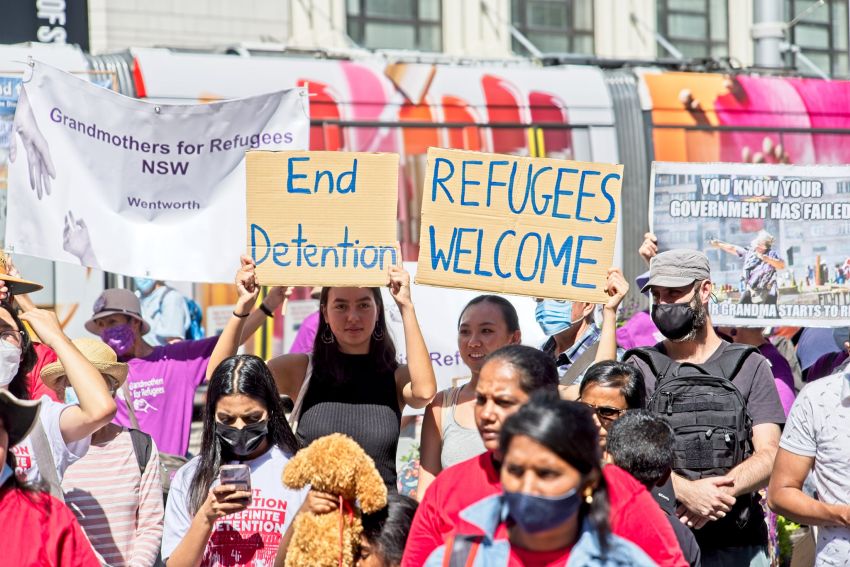
One of the Australian government’s most pronounced and undeniable obscenities is its continuing effort to gut and empty international refugee law of its relevant foundations. Instead of being treated as a scandal, populists the world over have expressed admiration, even envy: If they can get away with that, what might we do?
Australia has also made its greatest contribution to deterring unwanted arrivals, creating the most ruthless, tropical detention network for individuals who, unblessed by paperwork, arrive by boat with the aid of people traffickers and are duly told they will never settle in Australia.
These “unlawful” arrivals – the language itself is in contravention of the United Nations Refugee Convention – are duly passed on the refugee camp conveyor belt, where they face ruination, despair and sadistic prison wardens. To Manus Island or Nauru they go, awaiting settlement in another country.
New Zealand in 2013 offered some mitigation to these ghastly conditions. Australia expressed no interest in resettling such arrivals: that great tradition of outsourcing obligations and responsibilities continued.
The agreement involved NZ accepting 150 of its annual intake of refugees from Australian detention centres. But the coming to power of a conservative Coalition, crazed by “turning back the boats”, all but killed the arrangement.
This did not stop other inglorious attempts, on Canberra’s part, to abdicate human rights responsibilities with the connivance of other countries. A resettlement deal was struck with Cambodia in 2014 costing in the order of $55 million. Unsurprisingly, only a few refugees availed themselves of this less-than-impressive arrangement. The next year, Australia tried, in vain, to coax the Philippines with an offer worth $150 million.
The 2016 agreement with the United States, hammered out in the last days of the Barack Obama administration, was seen as a diplomatic coup. It obliged Washington to take between 1250–2000 refugees, all of whom would be subject to US vetting. Australia, in turn, would accept a much smaller complement of refugees from Central America.
The arrangements were rubbished by the new President Donald Trump: in a now notorious phone call between Trump and Prime Minister Malcolm Turnbull, the President suggested that this “stupid deal” might help terrorists enter the US.
In another ingratiating action, Australia agreed to resettle 17 Cubans, who were found clinging to a lighthouse off the Florida Keys in 2017.
The pattern should be obvious: Australia will do everything it can to evade, circumvent and subvert a refugee processing scheme that is humane and generous.
Under the current, revived understanding, NZ will accept 150 refugees from Australia each year for three years, but only those who are already in detention. Canberra has made it clear that the deal will not apply to those subsequently making an effort to travel here by sea. “Australia remains firm,” said Home Affairs Minister Karen Andrews, adding, “illegal maritime arrivals will not settle here permanently. Anyone who attempts to breach our borders will be turned back or sent to Nauru.”
There is another nasty proviso: those refugees resettled in NZ will be able to reside in Australia. The Australian Department of Home Affairs said they will be allowed “to apply for visas to enter Australia on a short-term or temporary stay basis only”. This would also apply even after being granted NZ citizenship.
Acceptance was only reached after what were described as “bullish” and “intimidating” negotiations between Prime Minister Scott Morrison and non-government parliamentarians in 2019. Independent Tasmanian Senator Jacqui Lambie even claims that she was threatened with jail were she to reveal any details of the plan. “So, for the sake of humanity, I had no other choice but to shut up anyway to make sure that job was done.”
Lambie’s humanity should not be exaggerated. Negotiations with the government centred on securing her support to repeal laws permitting the evacuation of gravely ill refugees to the Australian mainland for medical treatment.
The Labor Party, with refugee policies which hardly differ to the Coalition’s, has tried to make hay from the government’s change. “This is an absolutely humiliating backflip,” said Andrew Giles, the Shadow Assistant Minister for Immigration. “It should not have taken nine years and that is the other big thought in my mind, the cost to those individual lives and the cost to all of us in this pointless, cruel intransigence by Mr Morrison.”
While Labor mocked, NZ Immigration Minister Kris Faafoi was self-congratulatory about his country’s record. “New Zealand has a long and proud history of refugee resettlement and this arrangement is another example of how we are fulfilling our humanitarian international commitment.” In marketing speak, Faafoi was pleased NZ could “provide resettlement outcomes for refugees who would otherwise have continued to face uncertain futures”.
While 450 refugees will find safety in NZ, that does little for 500 others. The cruel system remains in place, and is said to cost $2 billion next year. If anything, this revived agreement shows how far countries have pitifully fallen in their responsibilities in providing safety for the vulnerable and damaged.
[Binoy Kampmark lectures at RMIT University.]